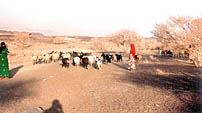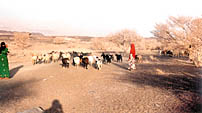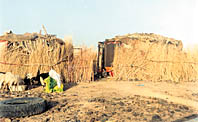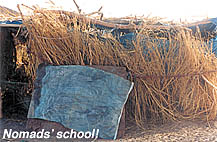
Nomads in Mareb [Archives:2000/14/Last Page]
April 3 2000
By: Hassan Al-Zaidi,
Yemen Times
It is difficult for the nomads to flourish and lead a prosperous life in the absence of the essential factors of living. Illiteracy, poor education, and harsh environment are the main factors that adversely affect their future denying them the benefit of development, guidance, and education.

The young and the old people regardless of whether they are educated or not, are forced to indulge in struggle with their tribe if there is any tribal dispute. They are responsible to offer safety to their tribe if there is any external aggression. So how can they develop themselves?
It is better for these nomads to leave their weapons, and go to build their future and develop their lives.
This is the fact affecting nomads in Mareb. Nomads form 70% of the total population of Mareb. There are two groups of nomads in Mareb: those who are still living in their areas inside tents, and are depending on animals and agriculture. Agriculture is limited to saving grass for their animals during the drought season. These nomads live in different areas of the governorate, such as in mountains and valleys. They form 40% of the total rate of nomads.
The other group of nomads is wandering groups. They go to the places that are far from soil areas and full of grass and water in order to graze their animals. This group forms 30% of the total nomad population in Mareb.
Dwelling:

Duties:
Women folks take care of sheep and goats. Men rarely help women in their duties. In addition to this, women take care of house and prepare food for their families and guests. Men go to the market to bring provisions and water. None of the nomads works for the state in any public or private company. We find that many people leave their houses in the towns and move to live among nomads habitations, especially when the flood ravages their lands. They lose their main resource and turn to take care of animals as a main resource to ensure their living.
Each family owns at least 25 sheep and goats, but some of them own more than a hundred. So, the average rate is between 25 to 150 sheep and goats. There are six main tribes in Mareb and each tribe has its own tribal boundaries, but nomads can graze their animals in the boundary of the other tribe. This is a good feature of nomads in Mareb because in some other areas there are some tribes who do not allow nomads to go and graze in their boundaries.
Food Habits of Nomads:
The most favorite food for nomads is roasted pastry. This pastry is put inside ashes till it becomes dry, then they take it and put it inside bowl and mix it together with milk and ghee. They eat this pastry with “Almasoob”, mixed with oil and ghee for breakfast and dinner. If there is any guest from outside the tribe, they slaughter sheep or goat.
Education:

Problems Faced by the Nomads:
Nomads suffer from lack of water. It costs them a lot because they bring it by cars from far off areas. They suffer from epidemic diseases as malaria, communicated by animals milk. In addition, nomads are suffering from different fields of life as economic, social, health fields.
Hence, we appeal to the government to pay attention to these nomads and to implement development projects in order to improve their living and give them economic, health and educational awareness.
——
[archive-e:14-v:2000-y:2000-d:2000-04-03-p:./2000/iss14/lastpage.htm]


